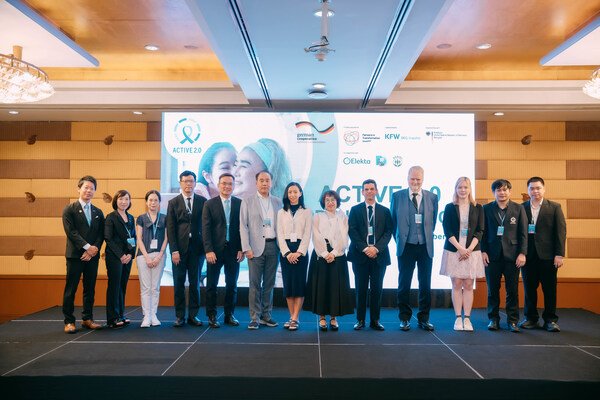Project ACTIVE Two Point Zero Launches to Strengthen Cervical Cancer Care Across Southeast Asia
14 November 2025 | Friday | News

A major step forward in regional collaboration for cancer care was announced today with the launch of Project ACTIVE 2.0 (Advancing Cervical Cancer Treatment & Patient Recovery Across Southeast Asia), a multi-country initiative that aims to strengthen radiation oncology services and improve outcomes for cervical cancer across Southeast Asia.
\This effort is backed by the German Federal Ministry of Economic Cooperation and Development - BMZ, DEG Impulse, the Embassy of the Federal Republic of Germany in Bangkok, Elekta, and the Federation of Asian Organizations for Radiation Oncology (FARO). The program will support clinical capacity-building and knowledge exchange in Thailand, Indonesia, Malaysia, Vietnam, Laos, and Cambodia, countries where cervical cancer remains a leading cause of cancer-related deaths among women.
"ACTIVE 2.0 goes beyond healthcare initiative – it is a regional platform for sustainable development and technical collaboration," said Professor Imjai Chitapanarux, President of Federation of Asian Organizations for Radiation Oncology (FARO). "We are directly addressing a critical public health challenge by elevating treatment standards and expanding access to advanced radiotherapy."
The initiative was mooted in response to alarming statistics: In 2022, Southeast Asia recorded 69,833 new cervical cancer cases with over 38,000 deaths[1]. Despite progress in screening and HPV vaccination, countries like Thailand continue to face significant disease burden, particularly in underserved communities.
"This project underscores Germany's ongoing dedication to fostering sustainable healthcare partnerships in Thailand and beyond," added Mr. Sebastian-Justus Schmidt, Honorary Consul of the Federal Republic of Germany in Chiang Mai, Thailand. "By bridging international expertise to Southeast Asia, Project ACTIVE 2.0 is laying the groundwork for stronger oncology services that benefit communities across Southeast Asia."
"Project ACTIVE 2.0 is designed to reinforce the clinical foundations of radiotherapy in the region," said Mr. Yohei Watanabe, Vice Director of Project ACTIVE 2.0. "In collaboration with FARO, we aim to equip healthcare professionals with global best practices to ensure every patient receives optimal care."
International medical experts, including radiation oncologists from Europe, Japan and India, will provide expertise and guidance to the project countries in collaboration with FARO. In Thailand, training and knowledge exchange activities will be developed in close collaboration with Thai medical institutions.
Project ACTIVE 2.0 represents a scalable model for cross-border healthcare cooperation, aligning with global health priorities and the UN Sustainable Development Goals. It offers a compelling example of how international collaboration can drive impactful changes in public health systems.
|
[1] World Health Organization, CANCER TODAY https://gco.iarc.who.int/today/en/dataviz/bars?mode=population&key=total&sexes=0&cancers=23&types=1&sort_by=value0&populations=104_116_360_418_458_608_626_702_704_764_96 |
Most Read
- How Does GLP-1 Work?
- Innovations In Magnetic Resonance Imaging Introduced By United Imaging
- Management of Relapsed/Refractory Multiple Myeloma
- 2025 Drug Approvals, Decoded: What Every Biopharma Leader Needs to Know
- BioPharma Manufacturing Resilience: Lessons From Capacity Expansion and Supply Chain Resets from 2025
- APAC Biopharma Review 2025: Innovation, Investment, and Influence on the Global Stage
- Top 25 Biotech Innovations Redefining Health And Planet In 2025
- The New AI Gold Rush: Western Pharma’s Billion-Dollar Bet on Chinese Biotech
- Single-Use Systems Are Rewiring Biopharma Manufacturing
- The State of Biotech and Life Science Jobs in Asia Pacific – 2025
- Asia-Pacific Leads the Charge: Latest Global BioSupplier Technologies of 2025
- Invisible Threats, Visible Risks: How the Nitrosamine Crisis Reshaped Asia’s Pharmaceutical Quality Landscape
Bio Jobs
- Sanofi Turns The Page As Belén Garijo Steps In And Paul Hudson Steps Out
- Global Survey Reveals Nearly 40% of Employees Facing Fertility Challenges Consider Leaving Their Jobs
- BioMed X and AbbVie Begin Global Search for Bold Neuroscience Talent To Decode the Biology of Anhedonia
- Thermo Fisher Expands Bengaluru R&D Centre to Advance Antibody Innovation and Strengthen India’s Life Sciences Ecosystem
- Accord Plasma (Intas Group) Acquires Prothya Biosolutions to Expand Global Plasma Capabilities
- ACG Announces $200 Million Investment to Establish First U.S. Capsule Manufacturing Facility in Atlanta
- AstraZeneca Invests $4.5 Billion to Build Advanced Manufacturing Facility in Virginia, Expanding U.S. Medicine Production
News











